Menu
Menu
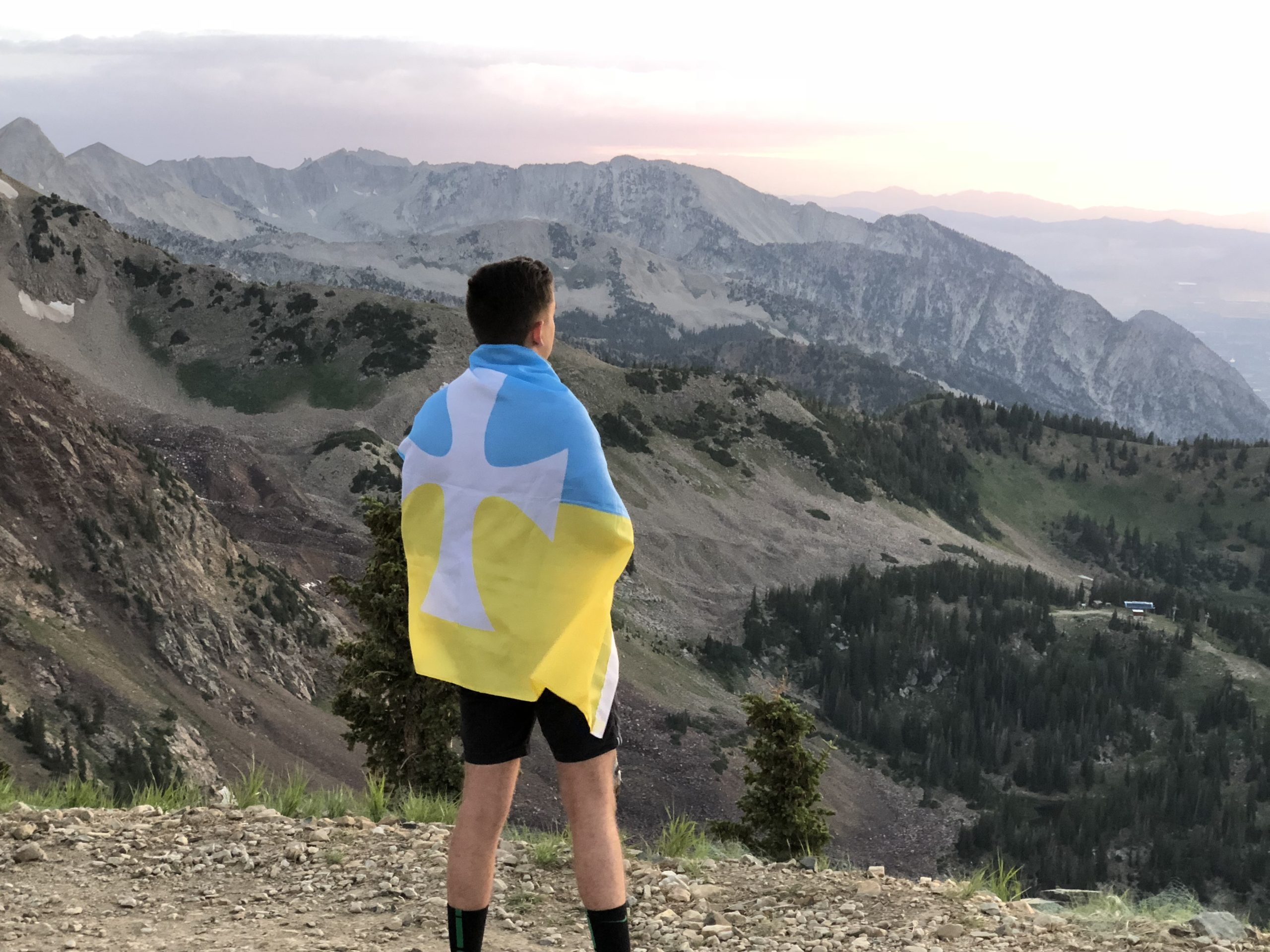
BY ASHLEY SZATALA
Tovar, SAM HOUSTON 1986, discusses the importance of being authentic to yourself — and the importance of making a difference in the lives of others — as he seeks to launch a nonprofit to meet the needs of young adults diagnosed with autism and developmental and intellectual disabilities
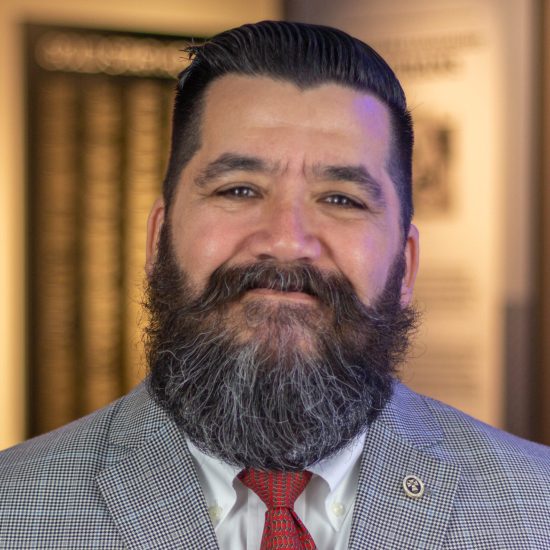
Transformational leadership is the practice by which leaders inspire and empower others to innovate and create change that will positively impact the Fraternity and ultimately the world. The transformational leader first must learn to manage self before being able to lead others and cultivate action within their community and campus.
The driving forces behind Order of Constantine Sig Jose Tovar’s, SAM HOUSTON 1986, decision to quit his job and focus full-time on establishing a nonprofit day program for young adults with autism and developmental and intellectual needs are twofold. First is love for his son, Marcos, and second is needing to come up with a solution to a problem. Lengthy waitlists at facilities that meet the needs of such adults keep his own son from enjoying an independent lifestyle, and the waitlists keep Tovar from having peace of mind about his son’s safety and security as they both age. Studying and teaching the Transformational Leader Program's True North Leadership Certificate material helped put into perspective his purpose and act as the catalyst for founding the nonprofit Redoma.
Tovar discusses below the challenges he and his son have faced with receiving affordable and accessible care, the deeper meaning of the name Redoma, the role the Fraternity has played in his life, and his approach to transformational leadership and what putting that into practice means to him.
You’re a father to a young adult on the autism spectrum disorder. Tell me more about your son, Marcos, and the kind of relationship you both share.
There are a lot of blessings, but there also are some challenges. I get a lot of hugs. Together we go to church. He loves to go out and eat, and he's got a very good taste, so it can be expensive. He’s very adventurous, and he loves staying in hotels. He loves the whole idea of going someplace. It's not so much about a destination as much as, ‘Hey, this is a new room.’ He's a great traveler.
He may be 22, but in a lot of ways he is just a typical father-son teenage relationship where, for example, if I change the words of a song or if I make jokes, he finds it embarrassing, and then in some instances, he loves it.
There's some things that I will never experience. Like, I will not have grandchildren, and I will not be at his wedding. There's just certain things that are not possible. It's something that I've come to accept.
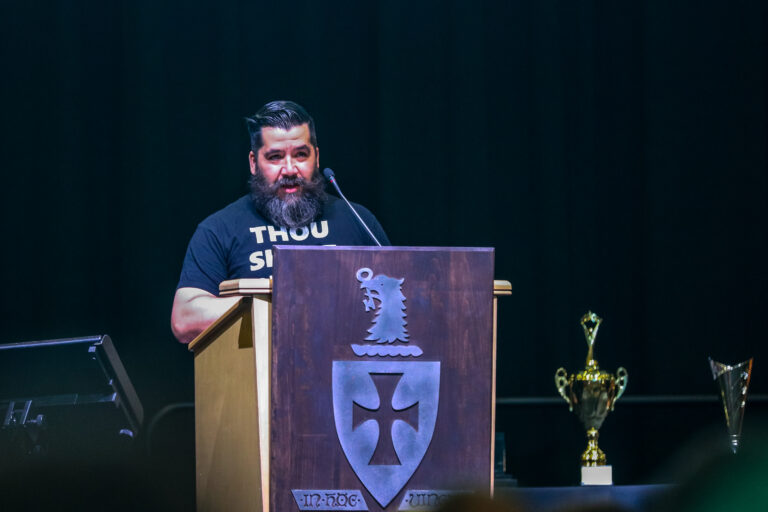
What kind of challenges have you and your son faced as he’s entered adulthood?
Pre-COVID, we sought help with what is called ABA, adaptive behavior analysis therapy. I had a fantastic group of people that saw my son grow up, and these are the same folks that would support me when I work and travel.
This place [Marcos] was going to was a fantastic place. I did not know how spoiled we were, how beautiful and how good these people were. The challenge as he became an adult is that services for insurance were no longer paid [Texas recently expanded coverage for ABA therapy after Marcos had aged out]. They started questioning the benefits of the therapy before he turned 16. The idea that therapy stops and you no longer need therapy after a certain age is just dumbfounded to me. [The facility] told me, ‘Hey, the insurance will only cover so much. Can you pay the rest?’ Absolutely. And they give me a prorated rate, and then sometimes, when I couldn't pay, they would give me credit, and later I would pay it. And then eventually, the insurance just said, ‘No, we're just not going to cover it.’
So, you know what [the facility] did? They developed a day program where I could pay out of pocket. For the two years he was there before COVID, I was paying out of pocket, and it was affordable. Yeah, I was paying out of pocket, but it was worth it. He was safe. He was loved. It was people that he knew. And they just sort of offered this program to him and his peers.
But eventually, when COVID died down, it changed dramatically. People that knew him, all of that just dried up. When you enter adulthood, insurance doesn’t pay for it. So, you don't see as many facilities offering support and services. There's some good ones out there, and there's the waiting list for them, and then there's some that are not so good. So, we started looking for some facilities. He wants to be independent. He wants to have his own place where I don't have to tell him to turn the light off or make the bed.
You worry about the services, what kind of social life you can offer them, and then there's the question of continuity. What happens when I'm gone? Those are things that can be quite overwhelming. But, there's ways to navigate that. You pray for the future, but you focus on the present. Be in the moment — this is what matters.
"... We run into [other parents] from time to time and they are just like me. [They’re] trying to figure out, ‘What do I do with my son or daughter?’ If I take care of Marcos, why would I just find a solution for my son when I can multiply that?"
~ORDER OF CONSTANTINE SIG JOSE TOVAR, SAM HOUSTON 1986
Tell me more about Redoma and how it will meet the needs of young adults diagnosed with autism and developmental and intellectual abilities.
The idea [for Redoma] is like the last program that he attended. He had a locker. It was kind of like a mini high school, but it was all kids on the spectrum. It would be something for them to do Monday through Friday. He had a purpose, and sometimes he wasn't so happy about it, but sometimes he was really looking forward to it because, ‘Hey, we have a field trip, and we're going to go to the Houston rodeo,’ or, ‘We're going to do this and we're going to do that, and then practice social skills.’ They would have field trips, go to the store, learn how to go to a restaurant and how to order food, or go to Walgreens and buy shampoo and toothpaste. Or, ‘Hey, help me make some copies and distribute this,’ kind of teaching some skills.
That program is what I want to mimic. I want to offer that in a day facility where I'm not going to fight with insurance companies. I'm not going to fight about when you pay for this. I'm going to go full nonprofit. I don't need to be huge. I need a small group, maybe nine people, so that they have a sense of community. And I want to have qualified staff because I feel there's a huge difference having trained, certified people than going to a place that is community-based and has volunteers. I’ll have a program director and maybe two or three therapists. If I have the right people there, and they're happy and they take care of the patient, the rest will take care of itself.
Maybe later I’ll turn it into a living facility, but that's down the road because that takes more regulation. And if I grow, the idea is to become a nonprofit franchise. Can I take Redoma and replicate it in another town 30, 50 miles away? I would love to have a template in place where someone could just follow that. And if I can help somebody create their own Redoma, that's ultimately the goal.
So, I just wanted to mimic that [program], and I needed to find a solution for my son. I need something for Marcos because the places that we have tried, it's a waiting list to get into the place, or the ones that don't have a waiting list, they are very well meaning but not something I will feel safe with him being there. Not all of [the people in the day program] are still in the area. But, we run into them from time to time and they are just like me. [They’re] trying to figure out, ‘What do I do with my son or daughter?’ If I take care of Marcos, why would I just find a solution for my son when I can multiply that?
What is the deeper meaning of the name Redoma?
It's a couple of things. First, because I’m going about it in the roundabout way. I'm creating my own solution to the issue. My son and his peers are going to be in the center of this roundabout [or redoma in Spanish]. We're going to revolve around them and provide them with a sense of community. They are the focus, they are the reason, they are the why. And we just go around it.
The reason why it's called Redoma is because I think it's every parent's dream, ‘I wish my kids could have it as good as I had it.’ I was fortunate to live in a roundabout [in Caracas, Venezuela]. It was the most welcoming and safe neighborhood, and we just called it the redoma. ‘Hey, do you remember Mary from la redoma? Or what about Charlie from la redoma?’
So, it's just that sense of community. That's my inspiration. And I want to create the same for Marcos and his peers where they have a little community where they can grow old. They can have a little apartment, and when they step out they know that they're going to be loved and safe. And they have purpose. They have something to do. And that would give me lots of peace. When I go away, I want to make sure that he's taken care of, and that's the way to do it. Ultimately, it's because I just want to take that slice of heaven and repeat it.
You left a vice president role in October 2022 to start Redoma. Tell me more about your decision to leave a full-time career to start this nonprofit. Any advice for others facing a similar situation?
I did some soul searching, and I did some consulting with some dear friends and some [Fraternity] brothers. It was yesterday a year ago that I decided to walk away from my role I had for a company. It's a fantastic company, but I was into a dilemma. I was working so I could make money to pay for a place that my son could go so that it would free me up so that I could work. So I could make money, so I could pay for it. It was like a snake eating its own tail. At that point, at the end of the day, what is it worth?
Once I became a single father with full custody [of my son], I knew that I had to take care of these things. I just thought I had more time. COVID changed everything for me. There's a famous line from the boxer Mike Tyson that “Everybody has a plan until you get punched in the face.” All the safety was all of a sudden just pulled from underneath me. So, I still had to come up with something, and I realized that my inactions were putting my son at risk by not having that solution.
It was through my involvement with Sigma Chi and facilitating the Sigma Chi Leadership Institute’s True North Leadership track [that I decided to leave my previous career]. I’m preparing the [facilitation] team and seeing the content of it and the challenge we present for our undergrads to become authentic leaders and to be their true selves. I'm looking at myself and thinking, ‘Okay, I am preparing a team to deliver this content, and yet, do I believe in the content? Do I practice what I preach?’ Eventually, I asked: ‘What is my true north? What is my true calling? What is my purpose?’
[Redoma] gives me a lot of purpose, and I can sleep at night. A year ago, I had concerns about, ‘How is this contract going through, and did I take care of that customer?’ Those are not my concerns anymore. Sure. I have concerns about, ‘Okay, I have a tax bill coming up. How do I pay that?’ I have to move some money around, but the concerns that got me up at night in the past, they just don’t matter when the safety and well-being of someone that you love is at stake.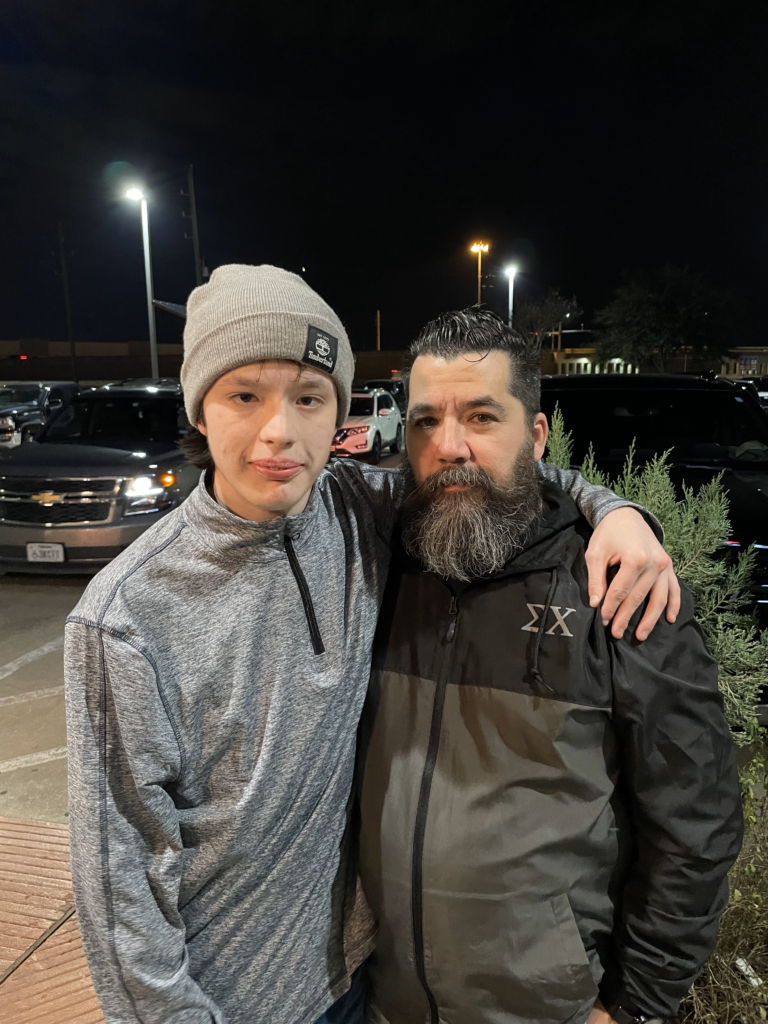
So, it’s just being true to yourself. I could not in good conscience spend time, prepare and do the best that I could do to facilitate this content and then not live it. So, it was quite a revelation, and then I went around and put into practice what it teaches: Do I have a personal board of directors? Do I have a support team? What are my life buckets? Which bucket needs more filling? All of those things, I started to question myself. Even I’m asking the undergrads to embrace this, as an adult and as a team lead, I’m trying to do the same in my own way. I’m not sure that I’m being up to snuff, but I am happy with what I’m doing.
All that matters at the end of the day is that you're happy with yourself. Work is work. It's always going to be there, but your loved ones aren't.
What are the next steps for officially launching Redoma?
Once I submitted my resignation, I had some savings and it helped, but I needed to create income. So, I launched a clothing line called Simpatico. It was something that I started years ago just designing stuff for myself. And then I would [use the clothing to] show appreciation to somebody. That let me create money, so that helps me pay for some of the expenses of Redoma. But Redoma was not formed yet. I didn't have any of the nonprofit stuff set up or anything of the sort. I was able to form a nonprofit in Texas as of Jan. 22, [2023]. I have the plans, I have a website [laredoma.org], and I also have had support from [Sigma Chi] brothers.
People want to donate, but they go, ‘I need my IRS deduction.’ Well, I don't have it. I have it for Texas, but as far as the IRS is concerned, I'm not a nonprofit yet. So that took some time. I found a local lawyer and he was helpful enough [for applying for federal nonprofit status], but it took forever. And then through brotherhood connections, somebody volunteered [to help with the process]. I just received the DocuSigns to have all that, and we are submitting the form for the IRS. Hopefully by the end of the year we'll completely be a nonprofit.
We have looked at a couple of properties, and I have an idea how much money it would take. From there it just comes to fundraising to actually find a location. And everybody I speak to tells me it's almost like that movie Field of Dreams. If you build it, they will come.
You’re a longtime volunteer for the Fraternity and Order of Constantine Sig. What role has the Fraternity played in your life, and why is it important to you to give back as a volunteer?
The Fraternity has given me an avenue, or a system, for me to exercise the values that my parents taught me. So, when we talk about courage, wisdom, courtesy, high ambition, self-control, integrity and fidelity, all of those things I learned at home.
My story [for joining] is a little different [from other brothers] because I didn't join until my last year in college. The people that I looked up to in the Fraternity, they tried to recruit me early on. And I said, ‘Nah, it's okay.’ But what I realized is that even though the Sigma Chi guys wanted me to be a Sigma Chi, even if I tried to turn them down, they remained friends with me. Other fraternities, once I say no, they put their attention elsewhere. Also, the guys that I looked up to as far as leaders on campus were all Sigma Chis. They sort of just accepted me and stopped recruiting me, and that worked. You don't have to push Sigma Chi. Sigma Chi will reveal itself in the way that you live your life and the way that you treat others.
I wanted to make sure that I live up to the [Ritual] obligation, and then there was also an opportunity for other people to benefit from what Sigma Chi can offer. Before my son was born, sure, I wanted to have a legacy. But now, I just want other people to have this experience. This is also selfish: I need men of character. I need more Sigma Chis in the world because I need people to love my son. And I need Sigma Chis in the world so it can be a better place, so that they can create a future world of good men so that they can take care of people.
You hear time and time again, the more you put into it, the more you get out of it. It became, ‘How else can I help?’ So, I started helping locally and then here and there. But it all comes from the love of just having this identity, this connection with people that I would never meet otherwise. I have close friends that are easily 40 years younger than me and 20 years older than me. Marcos knows some of them. He has an idea of Sigma Chi, but he will never understand the Ritual. It's just the opportunity to pay it forward.
"I wanted to make sure that I live up to the [Ritual] obligation, and then there was also an opportunity for other people to benefit from what Sigma Chi can offer. Before my son was born, sure, I wanted to have a legacy. But now, I just want other people to have this experience. This is also selfish: I need men of character. I need more Sigma Chis in the world because I need people to love my son. And I need Sigma Chis in the world so it can be a better place, so that they can create a future world of good men so that they can take care of people."
~ORDER OF CONSTANTINE SIG JOSE TOVAR, SAM HOUSTON 1986
Who do you look up to for inspiration or mentorship?
The people that I look up to are different ages and from different backgrounds, but they all have something in common. It's that they are selfless. They are kind, they think of others, they help — sometimes without being asked — and they don't seek the limelight. It's just that caring, servant heart that they have, and it manifests itself in the things that they do. That makes me want to get to know them better and to have a relationship with them. I've been blessed to have many of those.
I'm also blessed to have from the authentic leadership concept the idea of having a board of directors: a brother that will hold you accountable, a brother that will motivate you, a brother that you can go for coaching. Even before I found a name for it in authentic leadership, I've been able to have close relationships with brothers that provide that.
What does transformational leadership and putting it into practice mean to you?
Transformational leadership means taking a risk. It means not playing it safe. It means to transform something. To transform, you have to get rid of the shackles of comfort, those things that you are comfortable with or past behavior. But are you willing to change? And sometimes the change is not what you have in mind. You can think, ‘I want to do this,’ then all of a sudden find yourself on a different path and doing something entirely different. So, it means being bold enough and being courageous enough to ask those questions of yourself and to be authentic: Am I willing to transform? Am I willing to put in the work? Or is it just for show?
And then to be a leader just means stepping up front and facilitating and serving. I know it may be an overused term to be a servant leader, but the beauty of it is when you empower others to be the best versions of themselves. When you help them find the confidence that you see in them, that other people see in them, and then you help them tap into it — that is so fulfilling.
More info about Redoma:
Transformational leadership is the practice by which leaders inspire and empower others to innovate and create change that will positively impact the Fraternity and ultimately the world. The transformational leader first must learn to manage self before being able to lead others and cultivate action within their community and campus. This quarterly series highlights members who are putting transformational leadership into practice. For more information about Sigma Chi's Transformational Leader program, visit sigmachi.org/transformational-leader.
